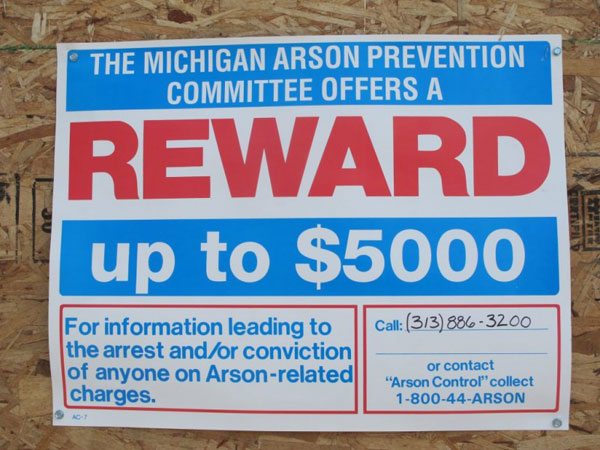
January 4, 2018, Bridge
The Michigan Arson Prevention Committee closed its doors on January 1st. The nonprofit, a 501c4 civic league and social welfare organization founded in 1973 with an IRS designation in 1987, had a single source of funding, the Michigan Basic Property Insurance Association. The group has disbursed more than $1 million in individual $5,000 rewards in exchange for information that has led to the arrest of over 1,200 arsonists. An effort to find a replacement funder over the summer to pay for the rewards and overhead, such as marketing and prosecution, failed.
Patrick Riney, the Committee’s executive director, said, “This isn’t just going to affect cities where arson is a big issue, like Detroit, Grand Rapids, Muskegon, or Flint. Every city at one time or another has used this program. It’s really unfortunate, but we’re out of business.”
The FBI reports that in 2015, only 20 percent of arson cases were solved. The chief of the Detroit Fire Department Arson Squad, Capt. Patrick McNulty, confirmed that arson is a difficult crime to solve, as the evidence usually goes up in smoke. “People sometimes need a motivation to talk and come forward, so the rewards help,” said McNulty. “Getting rid of them is taking a tool out of our toolbox that was really successful.” Detroit has led the nation in per-capita arsons for years. Numbers were still being tallied this week, but McNulty said suspicious fires declined by 20 percent in Detroit to about 3,200 in 2017.
Sign up for our free newsletters
Subscribe to NPQ's newsletters to have our top stories delivered directly to your inbox.
By signing up, you agree to our privacy policy and terms of use, and to receive messages from NPQ and our partners.
FBI records estimate Michigan had 1,999 arsons in 2015, with another 6,000 suspicious ones that caused nearly $200 million in damages. Those numbers include Detroit, but only fires that are investigated and proven intentional are counted as arson in the numbers. Due to limited resources and the volume of fires, Detroit is only able to investigate a fraction of all suspicious fires.
According to D. Jane Howard-Carlson, general manager of Michigan Basic Property Insurance Association, there is about $37,000 left for rewards; another group could still take it over. Bridge reports that “her group stopped funding the committee because it is losing customers. Michigan Basic was established by the legislature after the 1967 civil unrest in Detroit and was subsidized by other insurers when it lost money.” The subsidies ended in 2012, however, after state lawmakers required Michigan Basic to charge market rate for its policies.
Although it’s not easy to measure success with reward programs, fire officials tend to support them. The US Fire Administration currently lists five states with rewards for information that leads to catching arsonists: California, Florida, Maine, Missouri, and Texas. Massachusetts and Rhode Island have the Arson Watch Reward Program, sponsored by Property and Casualty Insurance Company. Since Michigan still has Crime Stoppers, a 501c3 that offers rewards for crime tips, it remains to be seen to what degree the absence of Michigan Basic rewards will affect the crime of arson in Michigan.—Marian Conway












